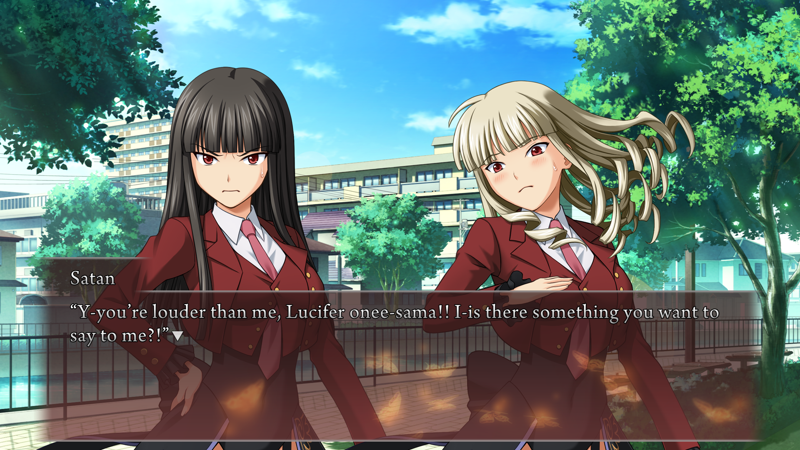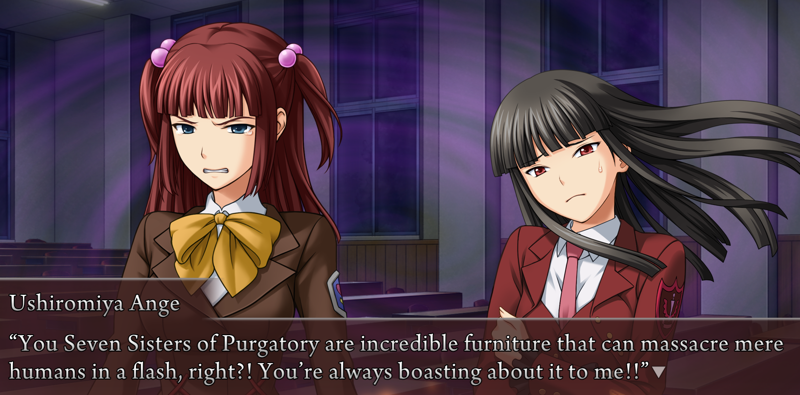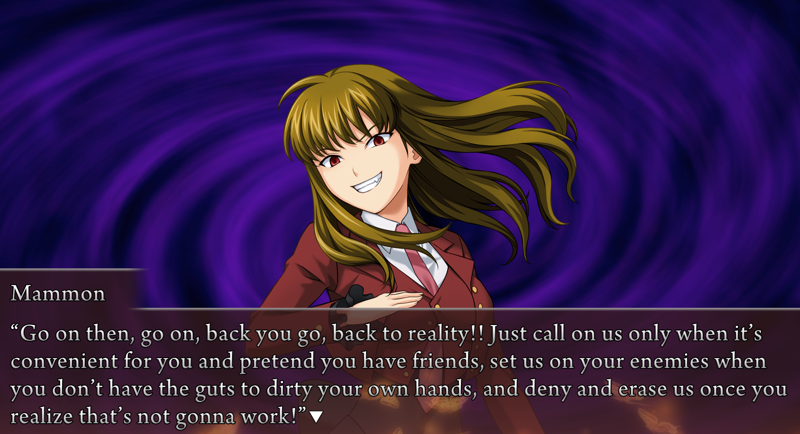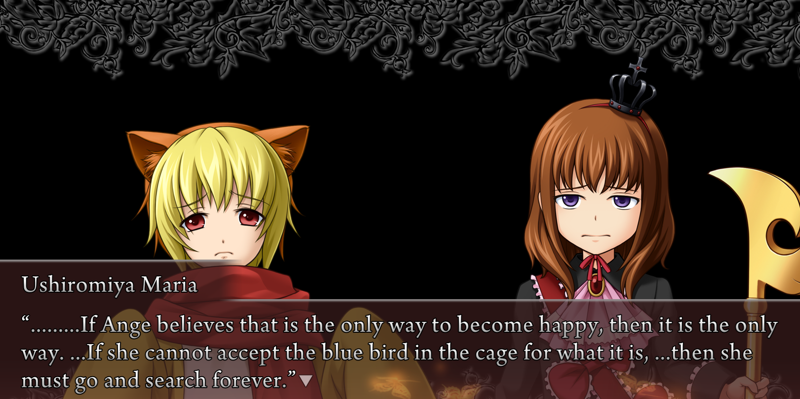Well, another blue moon has passed. We’re back on the Umineko liveblog.
This chapter is titled My World. It opens with the Sisters of Purgatory playing outside by a canal on a bright sunny day.

The most exciting part for me is that I can parse a much larger chunk of the dialogue just by listening now. It’s not super complicated, it’s mostly kids talking but still that’s cool.
At this point in the timeline, Ange is evidently able to sustain all seven sisters at once—her magic must have advanced quite a bit. She’s continuing to be bullied, this time over academic performance, and the seven sisters have been a comfort. Ange is aware of the narrative in the diary stories that the Seven Sisters were used to attack her family, but all the same she can’t hold a grudge against them.
Maria and Sakutarō show up too, in the same ephemeral form as the Sisters. Sakutarō gets heavily petted (もふもふ) as usual. He doesn’t seem to be enjoying it, but his embarassment is presumably part of the appeal of this kind of interaction.
Studying being the theme, Maria tells a story about how she was punished for not being able to divine the arbitrary rules of the education system. The conversation wanders on to (of course) magic, and Maria warns that Ange must absolutely believe her dream of resurrecting Battler will come true lest she start to produce the anti-magic toxin.
Demanding stuff, this magic.
The various articles of furniture give Ange a little pep talk. “The greedier our master is, the more our worth will increase.” declares Mammon. Then Beelzebub and Asmodeus burst in, proposing to play Shiritori, which gets a cultural note, fortunately since we’re about to see them play it on screen. Essentially you have to match the kana at the beginning of a word with the end of the previous word. Black scene. They’re arguing about what should follow ‘uryu’ (ウリゅ) which ends in a compound mora—would it be ゆ or りゅ?
Ange drifts off for a minute to muse on what a good time she’s having with her impressive new friend group. Tulpamancy: the sure cure to loneliness.
Of course a sweet scene like that is not going to last. Time skips forward to, what else, a bullying scene. Ange failed her test, and the girls who made a big deal of the average score are there to rub it in, complete with ahaha.wav.
Of course, the school bears a hefty chunk of responsibility for setting up this ‘average grade’ system in the first place and then publishing everyone’s scores—and if that’s not enough, it turns out they’re imposing collective punishment on the class. It’s not breaking the Geneva conventions if you’re not in a war! And for these rich kids, it’s a license to indulge in sadism, not a reason to form ranks against the teacher.
All Seven Sisters manifest to assure Ange that her classmates are well out of line.
We get more scenes of the classmates’ holier-than-thou bullying. They basically struggle-session Ange, forcing her to write an apology for all her supposed deficiencies and read it out. For five hours.
The music here is… odd…, it’s a kind of peaceful piano song, something that suggests a feeling of release, overlaid with wind sounds. The Sisters, with some back and forth, encourage Ange to cast the apology down on the floor rather than read it out. Meanwhile, on the physical plane, the classmates escalate to physical violence and start suicide-baiting Ange. This is going a bit Asama-Sansō incident, huh?
Ange finally snaps. She tells the Seven Sisters to slaughter the assembled classmates. Oh dear, I think I know where this is going…

The Sisters will not be able to kill even one person. And Ange will abandon magic, because it can’t keep its promises where it really counts.
Sure enough. That’s what happens.
Ange: 役立たずが役立たずが……!!あんたなんて大嫌いッ!!消えてしまえ…!!あんたなんて所詮、私の中の妄想じゃない…!!!
Ange: You are useless, useless……!! I HATE you!! Disappear…!! You’re nothing but a delusion inside my head…!!!
Some translation nuances for fun: the ‘you’ here is あんたなんて antanante, which could be more specifically translated as ‘things like you’. (It would sound awkward and break the flow in English). A more literal translation of the italic line might go something like ‘after all (所詮), aren’t you just a delusion inside me?’
With this, Lucifer turns to glass and shatters, followed shortly by the other Seven Sisters. The music changes to the sinister goldenslaughter EDM track.
Ange starts executing the sisters one by one—or if we accept her word here, she is dissociating and imagining her imaginary friends begging for mercy before she kills them, the role she wishes she could play in the real world. Satan manages to stammer out a bit of an explanation—naturally, that the anti-magic power is strong here, and Ange is weak—and Ange raises what an overwhelming limitation that is…
Ange: What. You can’t do it because humans are here? That’s your logic? Isn’t killing humans what you do?! If you can’t do that, then WHAT USE are you as furniture?!! DIE!!!
Confirming once more that in this narrative of how magic works, all the theatrics that took place on Rokkenjima to establish that sense of a place where the normal rules of society and physics are suspended, were vitally necessary for the magic to work at all.
I gotta say, props to Ryuukishi for making what seems like ridiculously chuuni dialogue feel extremely chilling and tragic in context.
Mammon presents a slightly different spin. Furniture, she declares, can only do what their master can do. If Ange is willing to start murdering people, the Seven Sisters will go along with it.
Mammon: And once you have that level of mental resolve, once you’re prepared to dirty your own hands—then, we will help you! But you haven’t reached that stage!!
Ange comes out and says they’re just delusions (妄想), illusions (幻想), daydyreams (白昼夢)—and Mammon launches into a whole ‘yeah, so’ speech.

Which ends with these impactful lines…
Mammon: That too is the duty of furniture!! Getting slammed against the floor when someone’s pissed off is also a chair’s important duty!!
If by that trifling service we manage to absorb our master’s bad mood even for an instant, there can be no greater honor for furniture. Kill me, deny me, your first and final friend…!!!!!!!
I love the inside of Ange’s head. It’s like full shōnen drama all the time.
Maria and Sakutarō stand nearby, looking on sadly. I’m pretty sure they’re going to get popped too. Maria declares that Ange has violated the Mariage Sorcière.
Ah, but the music switches back to piano as Ange gets tears in her eyes. She tells the pair to ‘disappear on their own’—she doesn’t want to imagine violently killing them. Her doubt nevertheless damages Sakutarō. Maria coldly declares this an act of ultimate contempt. Ange, however, presses on.
Ange: それが魔法?それが魔女?!それがと……もだち?!そなの、私の認めないわ!!
Ange: Is that what you call magic? Is that what you call a witch? Is that what you call……a friend?! I can’t accept that!!
Quoting the Japanese because it sounds even punchier. I think you could translate this as more like “Is that magic?” In any case, this anti-magic bombardment is enough to blow away Sakutarō. We abruptly cut to a greyscale flashback—Kuwadorian, although I guess this is more the fantasy realm of the Mariage Sorcière. A child-Ange voice taunts Maria that stuffed animals are nothing more than that. Maria, sobbing, retorts that, upon her name, she expels Ange from the alliance.
In a brief aside, present Ange comments: perhaps one day she will ‘observe it again’ and ‘acknowledge that it wasn’t a dream’, rather than the ‘reality’ she had decided on previously. We dive back into the flashback, and Ange recites the ‘apology’, in part to reject that old ‘daydream’ world.
So the act of rejecting magic is here to go along with the most brutal, confining dictates of a fundamentally violent and unjust society. Meanwhile, on Rokkenjima…
But, we’re not done here yet. Ange goes off script. She says she was supposed to have died with the rest on Rokkenjima. She reiterates that nobody will save her here.
Ange: After all, this isn’t a fantasy world—it’s the real world.
Yeah, hm. Is it though.
Ange ends up begging one of the classmates to just go through with it and kill her. Or she’ll kill herself. Of course, they don’t, this ain’t the lichi hikari club here. Ange starts to pass out, and at that point a teacher finally shows up (these kids have been unsupervised by adults for five straight hours) and decides things have gone too far. To Ange this is proof: only humans, not daydreams, can save her.
Maria and Sakutarō appear on the otherside of the floral border to comment. The blue bird story is invoked once more.

I gotta say, now the capstone on this arc has arrived, Ryuukishi is such a master of tragic inevitability. The development here feels in some ways theatrical, with each scene a symbolic component advancing the argument—although there’s a lot of scenes that are just colour too.
So, remarks.
I have a friend—not someone likely to read this, tbh it’s been a long while since we spoke—who went through a process of realising she was plural and developing an alter. She got involved in the kind of, plural subculture, and at a certain point became convinced that it was nothing more than a cult and tried to suppress her alter by force of will. This, predictably, went badly, and she had a severe psychotic break in which she became convinced she had to take her entire family off grid to protect them from internet brain worms. She was able to recover, but not by treating the experience of having an alter—whatever ontology you construct for that, an entire separate person or an altered state of mind—as a meaningless delusion. But it did ultimately necessitate getting out of an untenable situation.
Umineko at this point has certainly furnished the skeptic with plenty of ammo. No locked-room mysteries or anything here—in this scenario the only reason to believe in magic is that facing a ‘reality’ as miserable as Ange’s unvarnished is impossibly miserable. And the question is thus posed, is this enough?
Except that’s not really what it’s about. It’s not trying to say, oh, whoever wrote those old grimoires constructed a magic world to cope with their trauma. Rather it’s using the angle of ‘magic’ to shine a spotlight on the sort of subjectivity you develop when there is just no good option, no escape, inevitable pain.
Such a subjectivity need not be so positive as a group of colourful invisible friends. It can take the appearance of, say, extreme self-loathing, a totalising worldview about how much you deserve everything that happened to you. It’s still something to get lost in.
I am someone who by nature takes a similar attitude to Ange. The idea of living in a comforting ignorance, unaware of the evils of the world, feels deeply wrong to me, even if all I can do about anything is be ineffectually miserable. Of course it is also inevitable, and I pick and choose which evils to devote my attention to like anyone. Here in Umineko, meanwhile, Ange’s decision to suppress her ‘magic’ worldview and devote herself to ‘reality’ is presented as very clearly a tragic one. On the other hand, there is no logical argument presented to why Ange is incorrect in her assessment. It’s kind of like “she’s right, but she shouldn’t be forced to say it”.
Once again, I assume this is, beyond being a compelling tragedy in its own right, setup-by-example to help us understand the motivations of whoever wrote the bottle stories. If building an elaborate fantasy friend circle is a way to cope with the immiserations and cruelties of the real world… writing and rewriting fantastical versions of the events of Rokkenjima 1986 is that, but more.
I think I’m just making the same points I’ve made before here, so let me also say: strong emotional punch of a chapter.
One thing I found interesting is how ‘prosocial’ the terms of the bullies were. They felt a need to constantly reaffirm—to nobody in particular, since they clearly know it’s bullshit and so does Ange, but they can cruelly prtend otherwise—that what they were doing to Ange was for her own good, that they were the victims of Ange’s antisocial malfeasance. It’s a bullying that’s integrated into the school system’s values, not hostile to it. This isn’t really my own experience of bullying, and it’s clearly exaggerated for narrative. It makes me think of other depictions of bullying in Japan I’ve seen, like Koe no Katachi; there also the target of the bullying is singled out for an inability to ‘fit in’, and the teachers are either passive or encourage scapegoating.
The next one is called Sakutarō, so… that’s probably going to be another big oof.
Comments